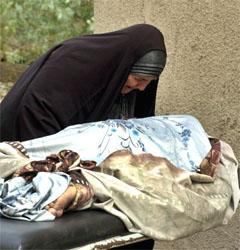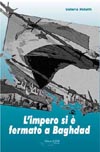October 11, 2006
As many as 654,965 more Iraqis may have died since hostilities began in Iraq in March 2003 than would have been expected under pre-war conditions, according to a survey conducted by researchers at the Johns Hopkins Bloomberg School of Public Health and Al Mustansiriya University in Baghdad. The deaths from all causes—violent and non-violent—are over and above the estimated 143,000 deaths per year that occurred from all causes prior to the March 2003 invasion.
The estimates were derived from a nationwide household survey of 1,849 households throughout Iraq conducted between May and July 2006. The results are consistent with the findings of an October 2004 study of Iraq mortality conducted by the Hopkins researchers. Also, the findings closely reflect the increased mortality trends reported by other organizations that utilized passive methods of counting mortality, such as counting bodies in morgues or deaths reported by the news media. The study is published in the October 14, 2006, edition of the peer-reviewed scientific journal, The Lancet.
"As we found with our previous survey, the majority of deaths in Iraq are due to violence—although we also saw a small increase in deaths from non-violent causes, such as heart disease, cancer and chronic illness. Gunshots were the primary cause of violent deaths. To put these numbers in context, deaths are occurring in Iraq now at a rate more than three times that from before the invasion of March 2003," said Gilbert Burnham, MD, PhD, lead author of the study and co-director of the Bloomberg School’s Center for Refugee and Disaster Response. "Our total estimate is much higher than other mortality estimates because we used a population-based, active method for collecting mortality information rather than passive methods that depend on counting bodies or tabulated media reports of violent deaths. Though the numbers differ, the trend in increasing numbers of deaths closely follows that measured by the U.S. Defense Department and the Iraq Body Count group."
Key points of the study include:
• Estimated 654,965 additional deaths in Iraq between March 2003 and July 2006
• Majority of the additional deaths (91.8 percent) caused by violence
• Males aged 15-44 years accounted for 59 percent of post-invasion violent deaths
• About half of the households surveyed were uncertain who was responsible for the death of a household member
• The proportion of deaths attributed to coalition forces diminished in 2006 to 26 percent. Between March 2003 and July 2006, households attributed 31 percent of deaths to the coalition
• Mortality data from the 2006 study reaffirms 2004 estimates by Hopkins researchers and mirrors upward trends measured by other organizations
• Researchers recommend establishment of an international body to calculate mortality and monitor health of people living in all regions affected by conflict
The mortality survey used well-established and scientifically proven methods for measuring mortality and disease in populations. These same survey methods were used to measure mortality during conflicts in the Congo, Kosovo, Sudan and other regions. For the Iraq study, data were collected from 47 randomly selected clusters of 40 households each. At each household selected, trained Iraqi surveyors collected data on the number of births and deaths that occurred in the household between January 1, 2002, and June 30, 2006. To be considered a household member, the deceased had to have lived in the home at least three months prior to death. When interviewers asked to see a death certificate at households reporting a death, it was presented in 92 percent of instances. The survey recorded 1,474 births and 629 deaths among 12,801 people surveyed. The data were then applied to the 26.1 million Iraqis living in the survey area.
While the survey collected information on the manner of death, the study did not examine the circumstances of the death, such as whether the deceased was actively involved in armed combat, terrorism, criminal activity or caught in the middle of the conflict. The study outlines other limitations of the survey method, including the hazards of collecting data during a conflict.
The results from the new study closely match the finding of the group’s October 2004 mortality survey. The earlier study, also published in The Lancet, estimated over 100,000 additional deaths from all causes had occurred in Iraq from March 2003 to August 2004. When data from the new study were examined, it estimated 112,000 deaths for the same time period of the 2004 study. The new survey also found that the number of deaths attributed to coalition forces had declined in 2006, though overall households attributed 31 percent of deaths to the coalition. Responsibility could not be attributed in 45 percent of the violent deaths.
According to the researchers, the overall rate of mortality in Iraq since March 2003 is 13.3 deaths per 1,000 persons per year compared to 5.5 deaths per 1,000 persons per year prior to March 2003. This amounts to about 2.5 percent of Iraqi’s population having died as a consequence of the war. To put the 654,000 deaths in context with other conflicts, the authors note that during the Vietnam War an estimated 3 million civilians died overall; the Congo conflict was responsible for 3.8 million deaths; and recent estimates are that 200,000 have died in Darfur over the past 31 months.
"Mortality after the 2003 invasion of Iraq: a cross-sectional cluster sample survey" was written by Gilbert Burnham, Riyadh Lafta, Shannon Doocy and Les Roberts.
Funding for the study was provided by the Massachusetts Institute of Technology and the Johns Hopkins Center for Refugee and Disaster Response.
Public Affairs media contacts for the Johns Hopkins Bloomberg School of Public Health: Tim Parsons or Kenna Lowe at 410-955-6878 or paffairs@jhsph.edu.

















